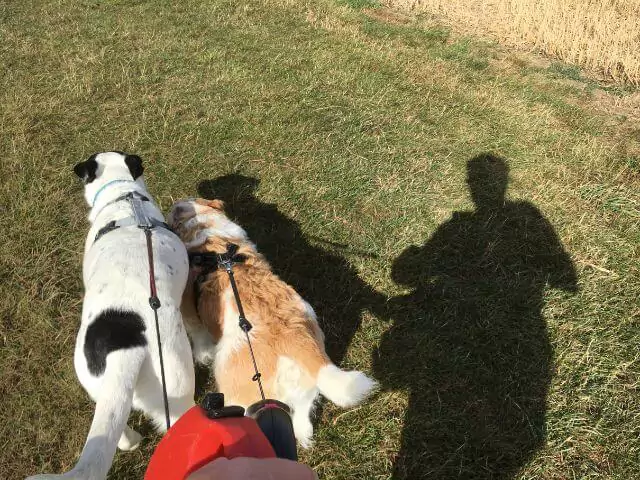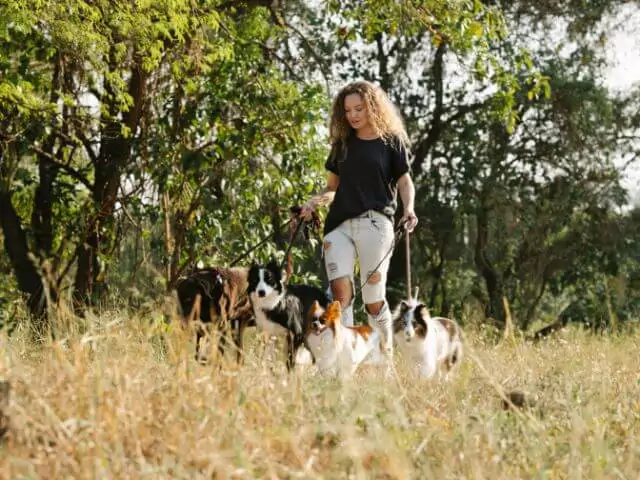If you’re ready for a career change and the thought of working with animals appeals to you, becoming a Dog Walker is a great way to earn on your terms and get fit in the process.
Events like Dog Walking Month can be the inspiration that propels people into this avenue of animal care. After all, it’s flexible, fun, and combines a love of animals with the great outdoors! But it’s wise to make sure it’s the right job for you before you get started.
Why Do Dogs Need Walks?
Firstly, you need to know why dog walking is important. After all, it will be the driving concept of your animal care business if you do decide to pursue this career.
Dog walks are essential to maintain the animal's physical health, the movement that is required during walks lubricates their joints and keeps them and their muscles moving. Regularly walking dogs also helps with weight management and can help keep their digestive system in check.
However, it’s not just physical benefits dogs experience from this activity, the main reason why dogs love walks is that they provide a huge boost to their mental well-being. When going for their stroll, they get the chance to investigate sights, scents, and sounds, which is an excellent way to waken these senses in these naturally curious animals.
Besides having the chance to sniff out new things, dogs also tend to enjoy the socialisation that comes with a dog walk. This is vital for their cognitive and behavioural development too, so getting outdoors is really a huge benefit to them.

How Often Should You Walk Your Dog?
Now you know why dogs need walking, the next thing you should know is how often to walk them. The answer to this varies by breed but a good rule of thumb is to keep a dog healthy it needs to be walked every day. When you’re dealing with a breed that has a higher level of energy or requires more exercise, this might increase to 2-4 walks a day.
Dogs are creatures of habit and thrive when they have a regular routine. It only takes the word ‘walkies’ for them to often burst into uncontrollable excitement. The human-to-dog interaction they get, along with an enjoyable break from their homes, is something they look forward to.
How To Get Into Dog Walking
If you’re seriously considering a dog walking career, it’s advisable to start small and test the waters by walking a neighbour’s dog, or pet canines within your family or friendship group.
While you may have your own dog, you need to get experience walking dogs who you are unfamiliar with. It also gives you a chance to practice walking in different weather and at different times of the day. These are just some of the ways to get an idea if you’re suited to dog walking jobs.
How Do I Know If Dog Walking Is For Me?
In addition to getting dog walking experience, it’s wise to ask yourself these questions before jumping feet-first into a dog walking career:
- Am I fit, healthy and strong?
You need to think about the impact working as a Dog Walker will have on your health. While it’s an excellent way to get fit, it might not be the best career choice for people with an existing injury, illness, or condition. Dogs of all sizes can be unruly on a lead, you’ll need to have the strength and ability to control them at all times.
- Can I walk unaccompanied for several hours?
Besides being able to walk independently for long periods of time, you need to be comfortable doing so as well. Depending on your and your client’s locations, dog walking can require you to walk through variable terrains. You will also have clients who need walking morning and evening, which will often be in the dark, so you need to feel safe and secure at these times.
- Am I near dog walking fields or dog friendly spots?
Asking yourself ‘Are there good dog walking places near me?’ is a wise thing to do as otherwise you may find yourself travelling for a large part of the day to take pooches to a suitable area. If not, you’ll need to factor in the cost of a car and make sure it’s kitted out with dog-safe cages and carriers.

How Much Is Dog Walking Per Hour, UK-Based?
On average, you can expect to get between £10-£24 per hour, per dog. However, that can vary if the dog needs additional care. Long haired dogs can often get muddy and matted on walks so they may require grooming.
In this instance, dog walkers will often offer additional services like grooming to maximise their income. Generally, your income will increase with experience and the skillset you possess. Dog walking professionals with regulated qualifications can typically charge more for their time.
In the UK, professional dog walkers can expect to earn over £26,500 per annum if they are actively walking around 13 dogs per day, five days a week.
What Do I Need For Dog Walking Jobs?
Many people thinking about getting into dog walking ask whether they need to be qualified. In short, no you don’t, but it’s very much advised.
As it stands, UK dog walkers don’t need to complete official training. However, if you’re planning to dog sit or care for the dogs within your own home as part of your service, you’ll need to obtain a Level 2 or a Level 3 qualification to meet the Defra Animal Activity Licensing requirements.
By becoming a Dog Walker, you can build a small animal business that generates a lucrative income, with the right know-how. If you go into it blindly you could set yourself up to fail. For instance, if a dog has an accident in your care you could be eligible and this can result in a costly bill
This is why dog owners will typically look for fully trained dog walkers, who can evidence their knowledge of dogs through the qualifications they hold. They also typically look for people with the necessary insurance.
By studying canine behaviour and canine care, you will stand out against other dog walkers in your area.

Become a Qualified Dog Walker
Our online dog walking professional course is an Ofqual regulated qualification that’s been designed to not only get you qualified for dog walking jobs, but other elements of professional pet care too.
Over a range of important modules, you’ll explore everything from how diet affects canine behaviour to dog walking with multiple dogs and how to start a dog walking business.
What’s more, as the subject matter covers pet sitting, dog day care and boarding, the qualification complies with the Animal Activity Licensing requirements needed to work as a Pet Sitter or Boarder. This will help you expand your service offering confidently and advance your earnings!
Find out more now by clicking the link below!
If your interest in dog walking was inspired by events like Dog Walking Month, you can keep track of all animal awareness days and events with our FREE calendar! Download it here.



















